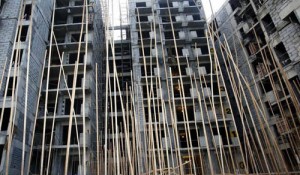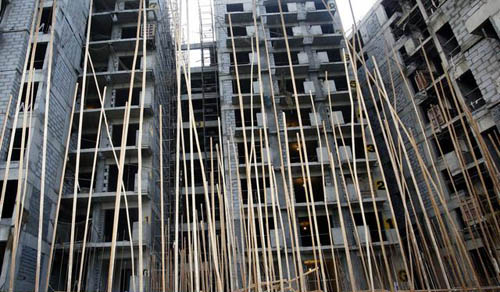By: Ravi Sinha
 Delay in real estate projects is something that invites disapproval and criticism in the collective consciousness. There is a general perception that the realtors deliberately delay the projects as they divert the funds to launch other projects. They are also criticized for delaying the projects to force appreciation of the said project. However, this is oft-repeated one side of the story. Developers too have their own list of grievances as to what takes a project away from their hands and they fail to deliver a project in time. Their list of grievances range from lacunae in funding mechanism to delay in approval at various level.
Delay in real estate projects is something that invites disapproval and criticism in the collective consciousness. There is a general perception that the realtors deliberately delay the projects as they divert the funds to launch other projects. They are also criticized for delaying the projects to force appreciation of the said project. However, this is oft-repeated one side of the story. Developers too have their own list of grievances as to what takes a project away from their hands and they fail to deliver a project in time. Their list of grievances range from lacunae in funding mechanism to delay in approval at various level.
The moot point here is how far is developer responsible for the project logjam? Naveen M Raheja, Managing Director of Raheja Developers is candid to say that to a large extent developers are responsible for the project getting delayed. He says in case the developer diverts the funds meant for a particular project to some other use, there is a possibility of the project getting delayed. Also, in case the developer sells the project at a rate in which he is unable to recover costs – again, there is a possibility of the project getting delayed. Sometimes the market is such that there are not enough buyers for the project.
“The developer must exercise fiscal prudence while carrying out his activities. Also, it is required that careful market analysis must be carried out as well so that the logjam is avoided. Funds must not be diverted to other projects & other uses. Also, adequate provisioning must be kept for spiraling input costs as well so that the project remains feasible,” says Raheja.
Boman Irani, Chairman & Managing Director, Rustomjee doesn’t agree that developers alone are responsible for the delay in projects. He quips that while there is all pressure on the developers for timely delivery, the approval authorities have no accountability of delays at their end. Slow-moving government approvals in Mumbai and across various other regions in India over the last nine months have created a drag on completion timelines and also project launches. The approval process involves connecting with more than 150 people in about 40 departments of central and state governments and municipal corporations and since some time now, files haven’t been moving in most of them. Then there is the prickly issue of more than 50 approvals before a project can even get off the ground.
Boman Irani also does not agree that funding mechanism is an issue. “Capital is not really an issue. For most of the reputed developers who have a track record of delivery, capital is genuinely not an issue. Bankers will lend to you, private equity is still very active in the market. Just as in our case, we’ve got sanctions from reputed banks and NBFC’s for more than Rs. 500 crores, in the last one month at extremely competitive rates. And I am sure you are hearing about many PE and other deals happening around in the market too. At a recent conference which was attended by various financial institutions, all funding institutions present expressed their willingness to fund real estate projects and developers of repute,” he says.
Virendra Shetty, General Manager, Marketing and Sales, Marathon Group also refutes the charge that developers deliberately delay the projects. He feels all developers would be glad to handover their projects within the stipulated deadline. However many factors causing delay or a logjam are not under the control of the developer. He cites many reasons for this and asserts that the biggest handicap is lack of coordination among the multiple authorities dealing with various permissions/approvals. Many times an approval is disapproved by another department. Mere policies are not enough; the problems arise out of overlapping policies and lack of co-ordination among the departments.
“In most of the cases projects are held up because of delays in various clearances from multiple authorities. The clearances are case specific and depend on the nature of project. Developers are required to get clearances from environment, high-rise, BMC, Urban Development, and MMRDA. Yet another reason is the lack of availability of construction material, and continuous hike in their prices. Shortage of sand during last year was one of the major causes for a delay in real estate projects in Mumbai Metropolitan Region (MMR). Similarly, many a time availability of enough water supplies at the construction site have caused delay. And now interest rates being high on every loan instrument, some people may be facing the problem of funds too,” he adds.
Deepak Mishra, Head- Marketing & Sales, Omkar Realtors and Developers says it is a common assumption that builder is always responsible for the delay. But delay in project occurs due to two reasons. At one end it could be scarcity of raw materials, increase of input costs or seasonal unavailability of skilled manpower. At the other end it could be due to approvals, sanctions, norms etc. Some unaccounted factors like the sand suppliers strike that was witnessed a few months back can also delay projects.
“We believe that policy guidelines are catalyst for smooth execution of quality project and never a handicapped in the smooth execution of the same. However policy guidelines demand approvals from various independent agencies for various projects which can be very time consuming. A single window system will help save a lot of time in execution of such projects,” he suggests.
In a nutshell, a developer may or may not be responsible for the project logjam. However, even if the developer is determined to deliver projects on time there are very many policy issues that act more as a hindrance than facilitator. The reluctance of banks to finance realty projects and no clarity of funding mechanism, with each lender having his own wish list, also comes in the way of timely delivery of projects. If the government is determined to stop wrong practices in the sector and force the realtors to deliver projects on the promised date, they also need to act as a smooth facilitator in the process.





